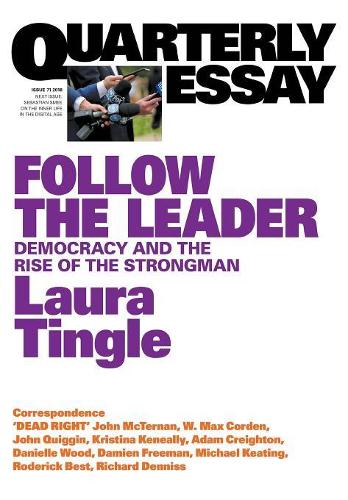
Follow the Leader: Democracy & the Rise of the Strongman: Quarterly Essay 71
(Paperback, 71st edition)
Publishing Details
Follow the Leader: Democracy & the Rise of the Strongman: Quarterly Essay 71
By (Author) Laura Tingle
Black Inc.
Quarterly Essay
17th September 2018
71st edition
Australia
Classifications
General
Non Fiction
Physical Properties
Paperback
144
Width 165mm, Height 232mm, Spine 15mm
232g
Description
What has gone wrong with political leadership in Australia And are things likely to change with a change of leader or government What is true political leadership, and how do we get it What qualities should we wish for in our leaders And why is it killing season for prime ministers In this wise and timely essay, Laura Tingle argues that democratic leaders build a consensus for change, rather than bludgeon the system or turn politics into a popularity contest. They mobilise and guide, more than impose a vision. Tingle offers acute portraits - profiles in courage and cunning - of leaders ranging from Merkel and Howard to Macron and Obama. She discusses the rise of the strongman, including Donald Trump, for whom there is no map, only sentiment and power. And she analyses what has gone wrong with politics in Australia, arguing that successful leaders know what they want to do, and create the space and time to do it. After the Liberal Party's recent episode of political madness, where does this leave the nation's new prime minister, Scott Morrison 'The Liberal Party has been ripped apart and our polity is the worse off for having one of its major political parties rendered largely ungovernable . . . Malcolm Turnbull's fate came down to a series of judgements made not just by him, but by his colleagues, who spent much of his prime ministership failing to follow the leader and also failing in their own collective responsibility for leadership.' Laura Tingle, Follow the Leader
Author Bio
Laura Tingle is chief political correspondent for ABC TV's 7.30. She won the Paul Lyneham Award for Excellence in Press Gallery Journalism in 2004, and Walkley awards in 2005 and 2011. She is the author of Chasing the Future- Recession, Recovery and the New Politics in Australia and two previous acclaimed Quarterly Essays, Great Expectations and Political Amnesia.
